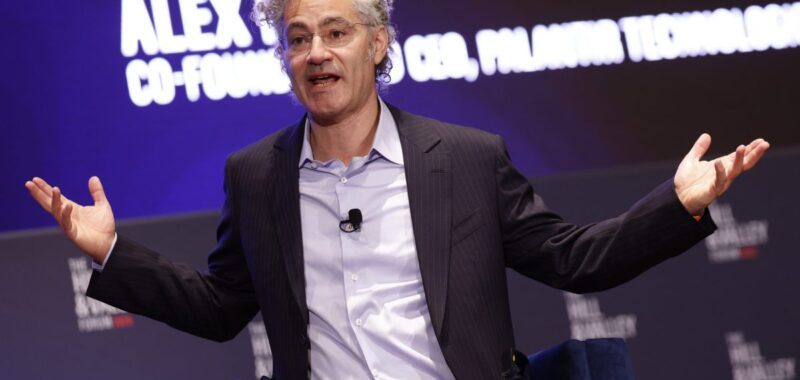
- Palantir cofounder and CEO Alex Karp hasn’t received stock from the company since it went public, but his existing holdings have ballooned in recent years, making him one of the best-paid CEOs in the nation, according to a new calculation dubbed “compensation actually paid.”
Investors awaiting earnings from defense contractor Palantir on Monday have already had a banner year, with the technology company seeing its stock soar. But few made out better than cofounder and CEO Alex Karp, who saw a multibillion-dollar jump in his net worth last year on the strength of his Palantir shares, which increased 340% in 2024.
Karp, who’s been with the company since he cofounded it, became $6.8 billion richer on paper, according to Palantir’s proxy filing.
That dollar figure appears in a column titled “Compensation Actually Paid to CEO,” which, Palantir says in a footnote, “does not represent compensation actually paid, earned or received by him during the applicable year.”
Instead, it represents the massive increase in the value of stock grants and stock options that Karp currently holds.
The compensation under the “actually paid” calculation dwarfs the $4.6 million Karp received last year under a more standard accounting of CEO pay.
Using those rules, the $4.6 million came from $1.1 million in cash with the rest representing the value of security and travel benefits.
Since the “compensation actually paid” column started appearing on SEC filings two years ago, it has created a new class of ultra-billionaires, the New York Times noted last year, when Karp was second on the list of best-paid CEOs by the newer metric.
“Yes, it’s real money, but it’s not liquid cash immediately,” said Rohan Williamson, professor of finance at Georgetown University’s McDonough School of Business.
“It’s not like he went home and they said, here is the check for $6.8 billion. But that’s what the value is,” he said.
A 10-year wait
As is fairly typical for a tech founder, Karp receives the bulk of his compensation in stock. Palantir went public in 2020 with Karp holding 141 million stock options and 39,000 restricted stock units, which were valued at $1.1 billion at the time. Notably, Karp has received no new grants or stock options since.
“Effectively, the huge pay package this person received—and it’s a very big one—is in 2020,” said Egor Matveyev, senior lecturer in finance at MIT Sloan School of Management. “They were designed as very long-term stock awards with a very long-term vesting period… everything he’s realizing goes back to that original grant.”
In an unusual twist, Karp had a very long vesting period—it would be 10 years before he would enjoy full ownership of his shares. A more typical schedule for performance-based stock awards is three years, according to Eric Hoffmann, vice president and chief data officer at Farient Advisors.
“They’ve basically trying to keep him there in place until he’s approaching retirement age,” Hoffmann told Fortune.
Pay now, pay later
At the time it was given, Karp’s award was quite generous. “I would say this is on the higher end, when it comes to a company of this size,” Matveyev said, noting the median CEO makes $20 million a year; Karp’s $1.1 billion over a decade works out to over $100 million annually.
But since then, Palantir’s stock price has increased by a factor of 12—and so has the value of Karp’s holdings. That shows a potential downside of “moonshot” compensation packages..
“If the company is doing really well, the realized value can be enormous,” Matveyev said. “We’re just giving away a lot of value.”
A Palantir spokesperson did not immediately respond to a request for comment.
Several comp professionals compared Karp’s ballooning compensation to Elon Musk’s deal with Tesla, which at one point was valued at $56 billion and hinged on his meeting certain benchmarks. (So far, the pay deal has been rejected twice by the Delaware Court of Chancery.)
“In the broader company space [this pay structure] is unusual; in the tech space, it’s not,” said Georgetown’s Williamson. “The view is, ‘I took a lot of risk, I bought the shares early, I did all the work, it’s built on my brain, it turned a profit very quickly, I deserve it. And that’s debatable, but that’s the structure.”
This story was originally featured on Fortune.com
Source link

